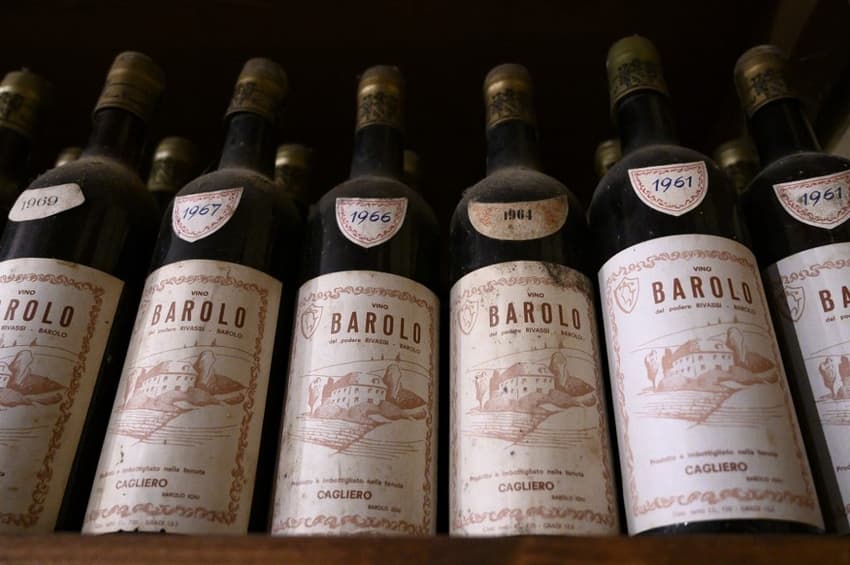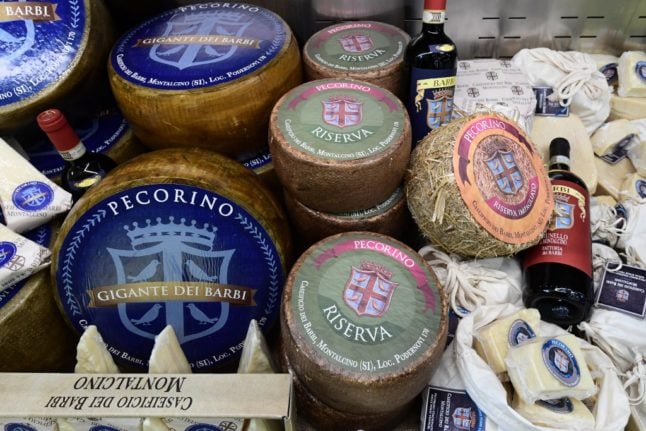Italian food and wine: What does the DOP label mean - and are these products better?

If you're shopping in Italy you'll see food and drinks that proudly declare their DOP, DOC, IGT or DOCG status. Here's what these labels mean.
Italians take their food very seriously - as is only right for a country whose diet is recognised as an intangible cultural heritage by Unesco.
As New York Times recipe developers can attest, any tweaking of the ingredients or methods used in traditional Italian recipes will often result in an outpouring of rage from Italians mortified by the desecration of their national cuisine.
That defensive reflex comes from a strong sense of pride that extends to food production, with farmers and artisan manufacturers fiercely defending their techniques - taking their disputes to court in many cases.
READ ALSO: OPINION: Why do Italians get so angry if you mess with classic recipes?
Italy adopted a labelling system that meant consumers could buy certain agricultural products - from vegetables to cheeses and wines - safe in the knowledge that its production and processing have been carried out in a particular geographical area and using recognised and traditional know-how.
This is the Denominazione di Origine Protetta (DOP) or 'Protected Designation of Origin' in English.
The designation indicates a particular geographical area, and usually also demonstrates that the producer has followed the traditional technique.
Under Italian law, it is illegal to manufacture and sell a product under one of the DOP-controlled indications if it does not comply with the criteria of that DOP. In order to make them recognisable, all DOP products carry a characteristic red-and-yellow seal, along with the name of the certifying body.
The system was first introduced in Italy in 1963, shortly after Italy joined the European Economic Community. At the time it was named Denominazione di Origine Controllata (DOC), and it was modelled on France's still-current Appellation d’Origine Contrôlée (AOC), whose origins date back to 1411.
There are several other labels to be aware of, too.
DOCG - In 1980, the stricter Denominazione di Origine Controllata e Garantita (DOCG) designation was created for wines. This is supposed to ensure an even higher degree of quality control - for example, DOCG wines must not only comply with rules on geography and production methods, but also pass a wine tasting panel.
In 1992, to bring Italy in line with newly-created EU-wide rules, the DOP label was introduced. It covers both DOC and DOCG products - on wines you'll usually still see additional labelling that tells you which of the two applies.
IGP/IGT - You'll also see some Italian products labelled Indicazione Geografica Tipica (IGT) or Indicazione Geografica Protetta (IGP), which are less strictly regulated than DOP foods and drinks.
IGT wines must come from the region identified on the label, but don't have to adhere to DOC and DOCG-level restrictions. IGP products are traced back to a certain geographical location for at least one phase in production, but not all phases, as is the case for DOP products.
READ ALSO: Bio, artisan and red label: What do French food and drink labels really mean?

Pecorino sheep's milk cheese made in Montalcino. Many 'Italian' cheeses and other products sold abroad do not have the labels indicating that they are made in Italy. (Photo by Miguel MEDINA / AFP)
So are DOP products better than non-DOP ones?
Unless you're talking specifically about DOCG wines, the DOP label isn't a quality mark; it refers only to how and where the product is made or grown, so there is nothing intrinsically better about a DOP mozzarella, olive oil or wine.
However, the marks tend to go to the smaller, artisan producers who take great pride in their products, so in reality many of the DOP products are the better ones.
READ ALSO: Are these Italian cheeses really the best in the world?
Famous Italian products that commonly have DOP labelling include - among numerous other items - parmigiano reggiano, prosecco, olive oil, and buffalo mozzarella.
Many brands sell these items without DOP certification, and the majority of 'Italian' products sold at supermarkets outside of Italy will likely not carry the labelling.
But Italy's certified producers, who follow centuries-old production techniques and fight fiercely against any perceived watering down of the rules, will tell you there's no comparison between their produce and that grown elsewhere.
Comments
See Also
Italians take their food very seriously - as is only right for a country whose diet is recognised as an intangible cultural heritage by Unesco.
As New York Times recipe developers can attest, any tweaking of the ingredients or methods used in traditional Italian recipes will often result in an outpouring of rage from Italians mortified by the desecration of their national cuisine.
That defensive reflex comes from a strong sense of pride that extends to food production, with farmers and artisan manufacturers fiercely defending their techniques - taking their disputes to court in many cases.
READ ALSO: OPINION: Why do Italians get so angry if you mess with classic recipes?
Italy adopted a labelling system that meant consumers could buy certain agricultural products - from vegetables to cheeses and wines - safe in the knowledge that its production and processing have been carried out in a particular geographical area and using recognised and traditional know-how.
This is the Denominazione di Origine Protetta (DOP) or 'Protected Designation of Origin' in English.
The designation indicates a particular geographical area, and usually also demonstrates that the producer has followed the traditional technique.
Under Italian law, it is illegal to manufacture and sell a product under one of the DOP-controlled indications if it does not comply with the criteria of that DOP. In order to make them recognisable, all DOP products carry a characteristic red-and-yellow seal, along with the name of the certifying body.
The system was first introduced in Italy in 1963, shortly after Italy joined the European Economic Community. At the time it was named Denominazione di Origine Controllata (DOC), and it was modelled on France's still-current Appellation d’Origine Contrôlée (AOC), whose origins date back to 1411.
There are several other labels to be aware of, too.
DOCG - In 1980, the stricter Denominazione di Origine Controllata e Garantita (DOCG) designation was created for wines. This is supposed to ensure an even higher degree of quality control - for example, DOCG wines must not only comply with rules on geography and production methods, but also pass a wine tasting panel.
In 1992, to bring Italy in line with newly-created EU-wide rules, the DOP label was introduced. It covers both DOC and DOCG products - on wines you'll usually still see additional labelling that tells you which of the two applies.
IGP/IGT - You'll also see some Italian products labelled Indicazione Geografica Tipica (IGT) or Indicazione Geografica Protetta (IGP), which are less strictly regulated than DOP foods and drinks.
IGT wines must come from the region identified on the label, but don't have to adhere to DOC and DOCG-level restrictions. IGP products are traced back to a certain geographical location for at least one phase in production, but not all phases, as is the case for DOP products.
READ ALSO: Bio, artisan and red label: What do French food and drink labels really mean?

So are DOP products better than non-DOP ones?
Unless you're talking specifically about DOCG wines, the DOP label isn't a quality mark; it refers only to how and where the product is made or grown, so there is nothing intrinsically better about a DOP mozzarella, olive oil or wine.
However, the marks tend to go to the smaller, artisan producers who take great pride in their products, so in reality many of the DOP products are the better ones.
READ ALSO: Are these Italian cheeses really the best in the world?
Famous Italian products that commonly have DOP labelling include - among numerous other items - parmigiano reggiano, prosecco, olive oil, and buffalo mozzarella.
Many brands sell these items without DOP certification, and the majority of 'Italian' products sold at supermarkets outside of Italy will likely not carry the labelling.
But Italy's certified producers, who follow centuries-old production techniques and fight fiercely against any perceived watering down of the rules, will tell you there's no comparison between their produce and that grown elsewhere.
Join the conversation in our comments section below. Share your own views and experience and if you have a question or suggestion for our journalists then email us at [email protected].
Please keep comments civil, constructive and on topic – and make sure to read our terms of use before getting involved.
Please log in here to leave a comment.